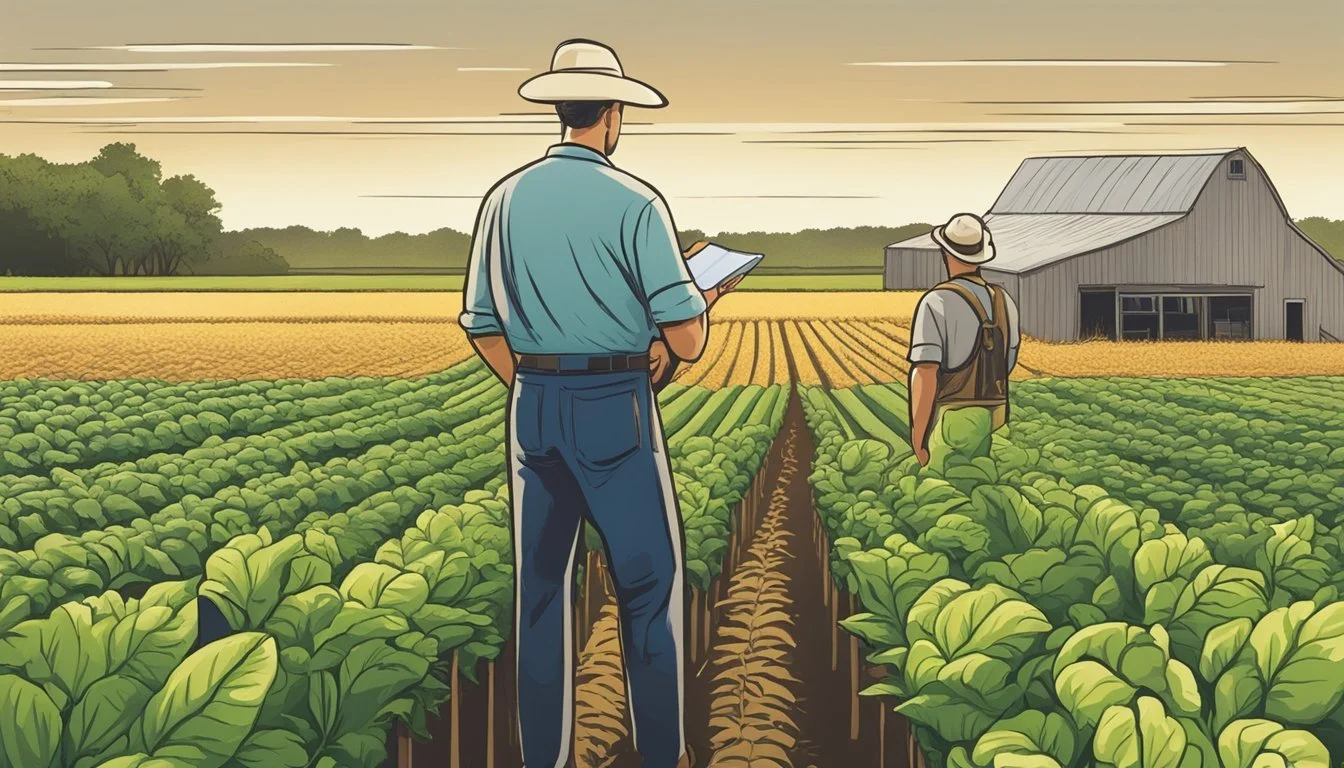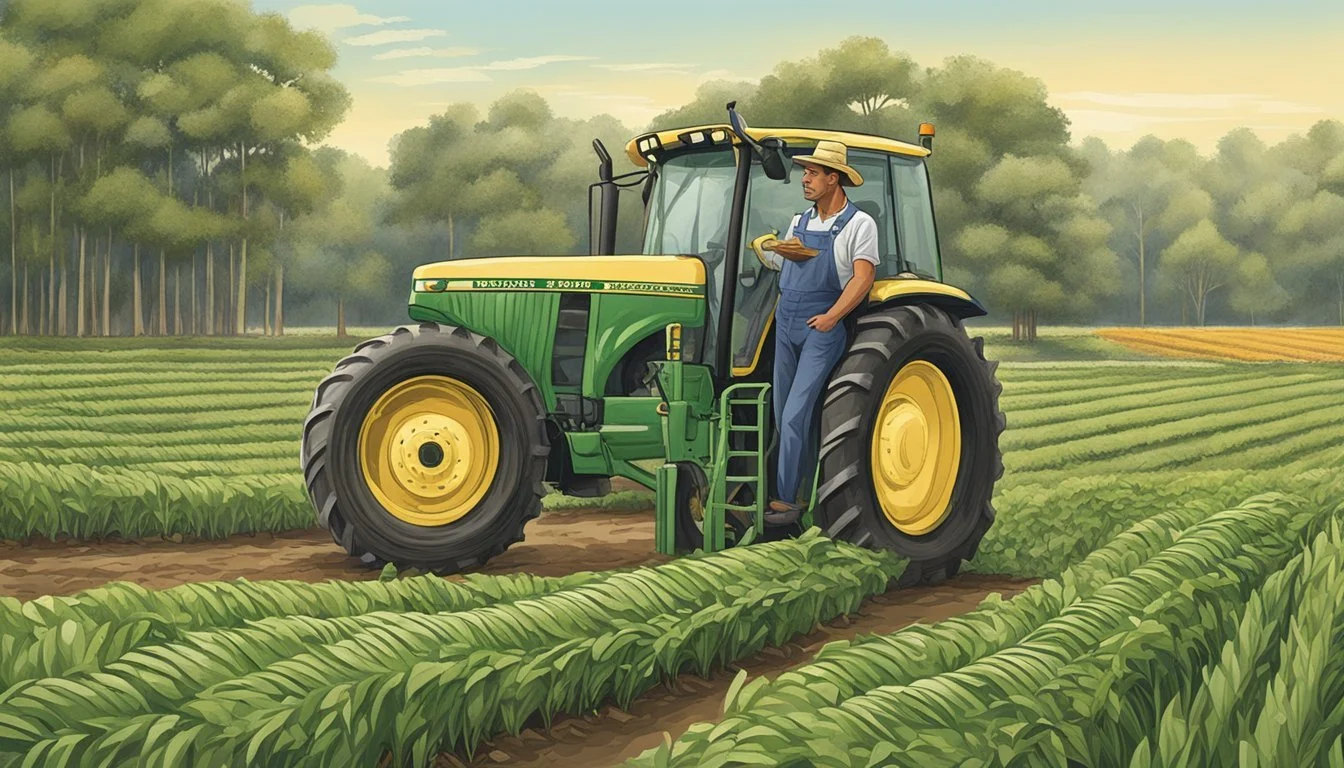Farm Loans in Louisiana
Navigating Financial Options for Farmers
This Article is Part of Our Guide on Farm Loans for All 50 U.S. States
Farm loans in Louisiana are integral to the agricultural community, supporting a wide range of activities from the purchase of land to the enhancement and conservation of existing farm properties. The Louisiana Land Bank is a key institution in this sector, specializing in providing financial services for everything rural—farm land, timberland, buildings, equipment, crops, and livestock are among the assets for which they offer funding. Their programs not only facilitate the procurement of essential resources but also fortify the long-term sustainability of the agricultural industry in Louisiana.
At the federal level, the USDA Farm Service Agency plays a pivotal role in bolstering the financial health of the farming sector in the state. With Direct Farm Ownership Loans capped at $600,000, the FSA makes it more feasible for farmers to purchase land, execute capital improvements, and implement soil and water conservation measures on family-run farms. Additionally, the Farm Service Agency provides a suite of loan types tailored to the varying needs of those who operate family farms, promoting growth, and maintenance throughout the state. Through comprehensive guidance and tools like the Loan Assistance Tool, the FSA simplifies the loan process, ensuring that farmers and ranchers can navigate the lending landscape with greater ease.
Understanding Farm Loans in Louisiana
Farm loans in Louisiana are financial instruments designed specifically to meet the needs of farmers and ranchers in the region. These loans serve to provide financing for various agricultural purposes. Lenders like the Louisiana Land Bank specialize in agricultural financing and offer tailored solutions to the state's farming community.
Loans can be used to purchase new land, improve existing properties, or cover operational costs. These financial products are vital in fostering the growth of Louisiana's agriculture, which includes crops such as corn and sweet potatoes. Despite challenges such as natural disasters, Louisiana's farms contribute significantly to the state's economy.
Types of Farm Loans
Ownership Loans: To purchase farmland.
Operating Loans: For day-to-day expenses.
Equipment and Infrastructure Loans: For purchasing machinery and building structures.
Loan Features
Maximum Loan Amount: At times specified, such as $600,000 by some programs.
Targeted Funds: Portions may be designated for beginning farmers and underserved applicants.
Loan Terms and Interest Rates
The terms of a farm loan can vary, with factors such as the loan amount, intended use, and the borrower's creditworthiness influencing the repayment period and interest rates. It is essential for borrowers to understand the rates and terms offered by the lender, as these will impact the overall affordability and sustainability of the loan.
Farmers and ranchers looking for farm loans in Louisiana can benefit from competitive rates and personalized service, underscoring the importance of having a robust support system for one of the state's critical economic sectors.
Types of Farm Loans Available
Farm loans in Louisiana are designed to support a variety of agricultural needs, including purchasing equipment and livestock, refinancing existing debts, and handling emergency situations. These loans cater to different stages of a farmer's career, from beginners to seasoned owners, as well as youth interested in educational agricultural projects.
Operating Loans
Operating loans provide the necessary capital for day-to-day farm operations. These can include but are not limited to, purchasing livestock, seed, and farm equipment. They also offer lines of credit for working capital to cover operating costs, including family living expenses until the farm becomes profitable. The USDA Farm Service Agency (FSA) provides a variety of operating loans, which farmers can apply for through an online loan application system.
Ownership Loans
Ownership loans are essential for farmers aiming to purchase or expand their farmland. This includes financing options for the acquisition of new land, construction, and improvement of farm buildings and structures. Guaranteed farm ownership loans are also available through the USDA, offering financing to farmers who might otherwise not qualify for standard commercial loans.
Emergency and Disaster Assistance Loans
Emergency loans are available to help farmers recover from natural disasters that affect crop yield, livestock, and land. These loans assist farmers in restoring or replacing essential property, covering production costs, and in some cases, refinancing existing debts. Dairy and poultry farmers, in particular, can benefit from these loans in times of natural disasters, as these operations are often heavily impacted.
Youth and Educational Project Loans
Youth loans support young individuals participating in 4-H clubs, FFA, or similar organizations. They can use the funding for educational agricultural projects, which may include buying livestock, equipment, or supplies. These loans foster the next generation of farmers by providing them the opportunity to establish a credit history and gain valuable farming experience.
Agricultural Real Estate Loans
Farmland loans cater to more than just crop production; they also cover recreational land, timberland, and hunting land loans. These loans help with acquiring farmland or refinancing existing loans, ensuring the farmer has the potential to boost productivity. Louisiana Land Bank specializes in such loans, offering a variety of agricultural real estate loans to support local farmers' diverse needs.
Loan Terms and Repayment Plans
Farm loans in Louisiana offer various terms and repayment plans to accommodate the financial needs of the state's farmers and ranchers. The United States Department of Agriculture (USDA) plays a pivotal role through its Farm Service Agency (FSA) in supporting agricultural operations.
Interest Rates
Interest rates for different farm loan programs may vary. For instance:
Direct Farm Operating Loans: 4.750%
Farm Ownership Loans (Direct): Details were not specified, but rates typically reflect market conditions.
Terms
Terms for loans are designed with the farmer's long-term viability in mind:
Down Payment Loans: These have a repayment term part of 20 years, with a partnering non-FSA financier often extending repayment to at least 30 years.
Margins and Closing Costs
FSA loans strive to maintain competitive terms to support farm sustainability, although specific margins and closing costs depend on the loan program and are not detailed here.
Repayment Plans
Farmers and ranchers can tailor repayment plans to their operational needs, recognizing that flexibility is crucial for agricultural business success. FSA programs often offer:
Fixed rates for up to 30 years
Variable rate loans with flexible terms
Repayment plans are structured to align with the borrower's cash flow, mitigating the pressure during off-peak seasons or during years with unexpected weather phenomena affecting yields.
Farmers in Louisiana are encouraged to consult with USDA and FSA representatives to obtain the most recent and applicable details for their specific financial needs.
Eligibility and Application Process
The USDA Farm Service Agency (FSA) provides various loan options suitable for beginning and family farmers in Louisiana. Eligibility for these loans generally requires the farmer to be an operator of a family farm, have a satisfactory credit history, and be a U.S. citizen or permanent resident.
Beginning farmers—those who have not operated a farm for more than 10 years—are given particular consideration, ensuring that the next generation of agricultural producers has access to necessary capital. Family farmers require loans to maintain and improve their farming operations, and FSA supports these entities through their loan programs.
Applicants can determine their eligibility using the Loan Assistance Tool available on the FSA's website. This tool guides prospective borrowers through the criteria and documents needed for the application.
The application process for farm loans has been made more accessible through an online loan application system. This platform offers:
An interactive, guided application process
Electronic signature options
The capability to attach supporting documents
Tools for completing a balance sheet
Assistance in building a farm operating plan
Below are the steps for the application process:
Assess Eligibility: Use the Loan Assistance Tool on the FSA website to determine eligibility.
Online Application: Submit an application through the USDA's streamlined online process.
Documentation: Provide necessary financial documents, tax returns, and farm plans.
Interaction with Loan Officer: The agency may connect applicants with a loan officer to assist with the application.
By following these concise steps, aspiring and current farmers in Louisiana can navigate the application process and secure the funds needed for their agricultural pursuits.
Financial Considerations for Farmers
When Louisiana farmers consider their financial needs, they must take into account several key components that impact their business success. First is operating costs, which encompass all expenses required to keep the farm running. These typically include feed and seed, which are essential for crop and livestock production. Farmers must strategically purchase these inputs, balancing cost with quality, to maintain efficient production.
Family living expenses also play a significant role in financial planning. Farmers must ensure their farming income sufficiently covers their household needs. Margins in farming can be tight, making margin protection strategies, like crop insurance, vital to safeguard against potential losses due to unpredictable factors such as weather or market shifts.
Key Expense Categories Details Operating Costs Feed, seed, equipment maintenance, etc. Family Living Expenses Housing, food, education, healthcare, etc. Margin Protection Insurance products and hedging options
Interest rates significantly influence loan information. The USDA Farm Service Agency offers loans with targeted funds for beginning farmers; these loans can help manage both operating costs and margin protection. Borrowers are eligible for up to $400,000 in direct operating loans. Additionally, through the Louisiana Land Bank, farmers can obtain farmland loans for purchasing new land or improving existing properties.
Understanding the types of loans available, their terms, and how they can be applied towards various farming expenses is crucial. Farmers should review options such as microloans for smaller financial needs, or larger Farm Ownership Loans, with eligibility for amounts up to $600,000 through the FSA.
In summary, financial planning for Louisiana farmers should integrate careful consideration of operating costs, living expenses, and viable financing options to ensure the economic sustainability of their farms.
Risk Management and Insurance
Farmers in Louisiana can take part in a variety of risk management and insurance programs to safeguard their investments. The USDA's Risk Management Agency (RMA) works in conjunction with Approved Insurance Providers (AIPs). These providers offer policies for producers, ensuring efficient loss adjustment and quick claims payments.
Available Insurance Types:
Crop Insurance: A fundamental component, it secures against the loss of crops due to natural disasters or the loss of revenue due to declines in the prices of agricultural commodities.
Livestock Insurance: Protection can extend to livestock, reflecting the challenges of raising animals, including market fluctuations and diseases.
Collateral: Collateral requirements are common in insurance agreements, ensuring that loan services can protect their investments.
Environmental Conservation: Beyond direct financial protection, insurance programs often incentivize practices that conserve, protect soil, and maintain water resources. Farmers are encouraged to implement sustainable practices that fortify the farm against environmental risks and potential climate-related hazards.
Insurance Advantage:
Benefit Description Risk Mitigation Insurance disperses the financial impact of unexpected events. Maintenance of Cash Flow Helps farmers manage cash flow, ensuring continuity after a setback. Enhanced Business Planning Enables better long-term business decisions with risk in mind. Conservation Support Incentivizes practices that contribute to environmental sustainability.
Farmers should consider the appropriate insurance coverage that aligns with their operational risks and environmental stewardship goals. It is essential for Louisiana's agricultural community to embrace these programs, effectively managing risk and ensuring the sustainability of their vital resources.
Support Programs and Resources
Louisiana offers a variety of loan programs and resources to support farmers and agribusinesses. These resources aim to provide financial assistance, development opportunities, and educational support in the agricultural sector.
USDA Department of Agriculture (USDA) Programs
The USDA Farm Service Agency administers several loan programs for Louisiana farmers. The Direct Farm Ownership Loan program has a maximum loan amount of $600,000, catering to beginning farmers and underserved applicants. Additionally, the Discrimination Financial Assistance Program provides aid to those who faced discrimination in USDA farm lending prior to 2021. Another USDA offering includes Marketing Assistance Loans, which furnish interim financing for producers to meet cash flow needs without having to sell their commodities when market prices are low.
USDA resources also support forest operations, with Farm Operating Loans available up to $400,000 for eligible borrowers. These loans are versatile and can also be utilized through Microloan programs.
Louisiana's Agricultural Support Framework
The Louisiana Department of Agriculture and Forestry (LDAF) collaborates with various state entities to aid farmers and agribusinesses through the Louisiana Farm and Agribusiness Recovery Grant and Loan Program. This program underscores Louisiana's commitment to revitalizing agricultural economies in the aftermath of disasters and market fluctuations.
Loan officers and agents across Louisiana are well-acquainted with these programs and can provide personalized guidance to farmers seeking farm credit and agribusiness loans to help sustain and expand their operations.
Educational and Community Resources
In Louisiana, educational agricultural projects such as those affiliated with 4-H clubs and the Future Farmers of America (FFA) offer educational support and resources to young individuals interested in agriculture. These programs are crucial for fostering the next generation of Louisianan agricultural professionals.
Moreover, the USDA's Rural Development initiatives and the Southern University Agricultural Research & Extension Center provide assistance and resources for small and mid-sized farmers, demonstrating a holistic approach to agricultural development in rural communities.








